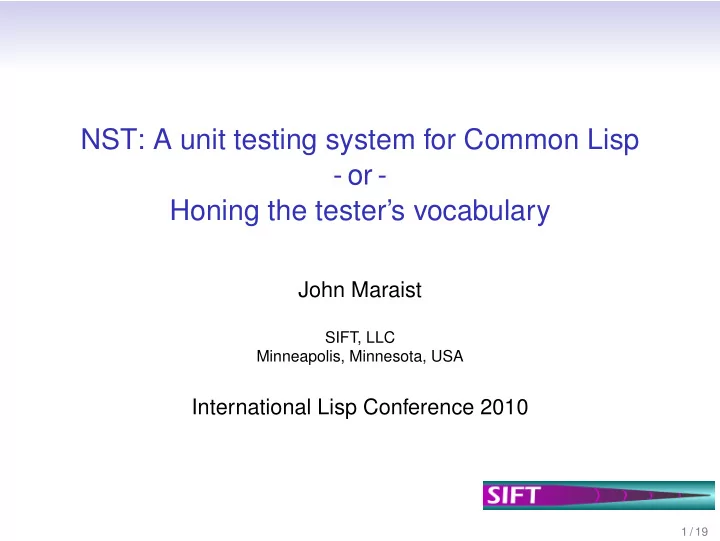

NST: A unit testing system for Common Lisp - or - Honing the tester’s vocabulary John Maraist SIFT, LLC Minneapolis, Minnesota, USA International Lisp Conference 2010 1 / 19
What’s in a test system? At some level, all (Lisp) test systems let you define four artifacts: • Fixtures establishing consistent test environments. • Criteria that describe correct behavior. • Tests applying a criterion to specific exemplars. • Groups of related tests. 2 / 19
Fixtures Faithful context reproduction • Provide a convenient, consistent environment for test evaluation. • Local name bindings. • Setup- and cleanup routines. • For example: • Database or other resource configuration. • Interchangeable sets of bindings. 3 / 19
Criteria What is “right”? • Non-nil vs. nil. • Normal completion vs. thrown error. • Easily extended — assert-equal , assert-error , etc. • Sequence of assertions. • More detailed properties of evaluation outcomes, result values. 4 / 19
Tests What do we check? • Could be combined with criteria — single form evaluated, null-tested. • More generally: association of criterion and form. • Via assertion/sequence of assertions. • Comparison to “answer key”. 5 / 19
Groups A family name • Convenient reference for a responsibly-large, hopefully growth-prone, set of tests. • Invoke tests, request results by single name. • We’ll always have package... 6 / 19
NST design philosophy In NST: • All four testing artifacts Criteria Tests Groups Fixtures • • • are separately defined and named. • Incorporate frequent operations are supported as features of the test system — not requiring additional programming of the underlying test framework representation. • Oriented towards “permanent” test suites — artifacts in code files: • Artifacts in files, loaded e.g. as a test system from ASDF . • Use REPL for digging into results, re-running individual tests. 7 / 19
What’s different From a high-level user view, NST is similar to LIFT or FiveAM. • Different macro names, keywords, etc. • But simple tests end up looking about the same. The main difference is in NST’s treatment of criteria. Each NST criterion: • Can be abstracted over criterion arguments. • Can encapsulate several different individual checks. • Can aggregate multiple reports of failure or error. 8 / 19
Why complex criteria? The benefit of these complex criteria is to better scale up to larger, more complicated test objects. • Arguments allow minor variations of correctness criteria within a general rubric. • Reduce verbosity of each test when invoking named criterion. • Reduce number of tests since separate checks not needed. . . • Without sacrificing level of detail. • Without one discovered failure hiding other issues. 9 / 19
Examples — basics Some simple tests: ( def-test-group some-number-tests () ( def-test it-is-even (: predicate evenp) 40) ( def-test hey-not-even (: predicate evenp) 41) ( def-test is-an-integer (: predicate integerp) 40) ( def-test hey-not-integer (: predicate integerp) 40.5)) 10 / 19
Examples — basics Results from these tests: Group some-number-tests: 2 of 4 passed - Check hey-not-even failed - Predicate evenp fails for (41) - Check hey-not-integer failed - Predicate integerp fails for (40.5) 11 / 19
Examples — combining criteria Two things to check: ( def-test-group more-number-tests () ( def-test even-int-40 (: all (: predicate evenp) (: predicate integerp)) 40) ( def-test even-int-40half (: all (: predicate evenp) (: predicate integerp)) 40.5) ( def-test even-int-41 (: all (: predicate evenp) (: predicate integerp)) 41)) 12 / 19
Examples — combining criteria Results from these tests: Group more-number-tests: 1 of 3 passed - Check even-int-41 failed - Predicate evenp fails for (41) - Check even-int-40half raised an error: Errors: - the value of excl::x is 40.5, which is not of type integer. Failures: - Predicate integerp fails for (40.5) TOTAL: 1 of 3 passed (2 failed, 1 error, 0 warnings) 13 / 19
Examples — naming criteria We can name new criteria: ( def-criterion-alias (: even-int ) ‘(: all (: predicate evenp) (: predicate integerp))) ( def-test-group still-more-number-tests () ( def-test even-int-40 : even-int 40) ( def-test even-int-40half : even-int 40.5) ( def-test even-int-41 : even-int 41)) 14 / 19
Examples — checking list elements ( def-test-group num-list-tests () ( def-test num-list (: each : even-int ) ’(40 40.5 41))) 15 / 19
Examples — checking list elements Results from these tests: Group num-list-tests: 0 of 1 passed - Check num-list raised an error: Errors: - the value of excl::x is 40.5, which is not of type integer. Failures: - Predicate integerp fails for (40.5) TOTAL: 0 of 1 passed (1 failed, 1 error, 0 warnings) 16 / 19
A separate language for criteria Really? • Not without disadvantages: harder to debug/investigate a criterion interactively. • Canard: “just program Lisp.” • NST’s :all vs. CL ’s and . • NST’s :each vs. CL ’s every . • If we want the expressiveness that arises from easily detecting multiple issues, the short-circuiting tendencies of CL ’s functions are not what we want. • Move from dispatch on these symbols to directly callable functions? 17 / 19
In the paper • A more complete review of NST’s features and syntax. • An overview of the implementation. • Detailed comparison of about a dozen CL test systems. 18 / 19
Conclusion NST adds a useful new test abstraction to Lisp’s testing toolkit. • Good experience with larger test suites. • Integration with ASDF . • Support for QuickCheck-style sampled invariant testing. • Some experimental support for: • More OO-style test methods. • JUnit XML output. • Development continuing. How to get NST: • ASDF-install. • CLiki: cliki.net/NST . • SVN: https://svn.sift.info:3333/svn/nst/trunk . 19 / 19
Recommend
More recommend